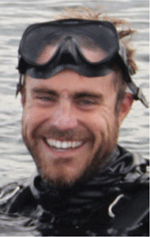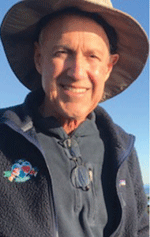The impact of oil and gas infrastructure in marine ecosystems: a global vision for informing decommissioning decisions
D. L. McLean A F , T. Bond B C , J. C. Partridge B , S. Rouse D and M. Love EA Australian Institute of Marine Science, Indian Ocean Marine Research Centre, Corner Fairway and Service Road 4, Crawley, WA 6009, Australia.
B The UWA Oceans Institute, The University of Western Australia, 35 Stirling Highway, Perth, WA 6009, Australia.
C School of Biological Sciences, The University of Western Australia, 35 Stirling Highway, Perth, WA 6009, Australia.
D Scottish Association for Marine Science, Oban, Argyll, PA37 1QA, UK.
E Marine Science Institute, University of Santa Barbara, California, Building 520, Room 4002, Floor 4L, Santa Barbara, CA 93106-6150, USA.
F Corresponding author. Email: d.mclean@aims.gov.au
The APPEA Journal 60(2) 476-479 https://doi.org/10.1071/AJ19153
Accepted: 17 March 2020 Published: 15 May 2020
Abstract
The offshore hydrocarbon basins of the world and their neighbouring countries are faced with an immense decommissioning challenge. Uncertainties in regulation and costs, coupled with limited environmental data, stifle consideration and support for alternative options to full removal. In separate regions, scientists and industry are forming partnerships and commencing research that advances understanding of regional and ecosystem-scale processes, including the habitat value of oil and gas infrastructure. With similar decommissioning-related marine research priorities being identified globally, a more coordinated approach to such research is needed: a global decommissioning marine research network and taskforce. This taskforce would not only be highly cost-effective, but it would also enable consistent approaches to science and management of the marine environment and secure protection and conservation of global marine resources. This network and taskforce would bring together leading scientists and experts in the oil and gas industry to develop an international research program that will significantly advance our understanding of the consequences to ecosystems as a result of decommissioning, as well as identify the differences and commonalities in environment–infrastructure interactions across different geographical regions. The outcomes would support sustainable installation and decommissioning practices worldwide and ensure that policies adhere to international agreements on environmental protection.
Keywords: global network, habitat value, knowledge transfer, marine science, science–industry partnerships.

Dianne McLean is a marine scientist who performs multidisciplinary research examining the effects of subsea infrastructure in our oceans. With extensive experience in the development and use of video imaging techniques, Dianne works closely with industry to design and implement effective scientific monitoring programs. She has a long history in researching anthropogenic effects on fish ecology and fisheries, including climate change, fishing and oil and gas development. Dianne is an eminent scientist in the field of decommissioning marine science. |

Todd Bond graduated from the University of Western Australia (UWA) in 2009 with a BSc(Hons) in Marine Science. Taking a research assistant position with UWA, Todd developed close working relationships with the oil and gas sector, researching how fish interact with their subsea infrastructure. This work sparked interest for his PhD and, since beginning in 2017, Todd has worked with many operators on the North West Shelf of Western Australia to understand better how fish and sharks interact with their subsea infrastructure, namely their pipelines. Todd has experience using several video-based methods to sample fish and marine growth associated with subsea infrastructure and has collaborated with academics through the UK, Australia and the US to address global decommissioning challenges. |

Julian Partridge is the Deputy Director, UWA Oceans Institute. Julian is a marine biologist with internationally recognised expertise in animal sensory systems and deep-sea biology. With over 30 years of research and teaching experience at world-leading universities in the UK and Australia, much of Julian’s work has linked engineering with biology, with projects directed towards both pure and applied research outcomes. Julian’s experience in science and business development enhances the UWA Oceans Institute’s marine research collaborations and capabilities. |

Sally Rouse is a Marine Ecologist based in Scotland. Her research involves the use of empirical studies and advanced spatial models to quantify the ecosystem and societal consequences of deploying and decommissioning marine energy infrastructure. Sally has recently joined the Scottish Government’s Marine Scotland Science (MSS) Division, where she leads the Offshore Energy Environmental Advice Group. Sally also chairs the Oil and Gas Environmental Research Forum of the Marine Alliance for Science and Technology Scotland and represents MSS on the Society for Underwater Technology’s (SUT) Decommissioning subcommittee and the SciBAr Network (Science Based Governance and Regulation of Arctic Energy Installations). In these roles, Sally works closely with industry, stakeholders and regulators to translate research outcomes into industry solutions and guidelines for policy makers and regulators. |

Milton Love is a research biologist at the Marine Science Institute, University of California, Santa Barbara. Milton has conducted research on the marine fishes of California for over 45 years, is the author of over 110 publications on the fishes of the Pacific Coast and has written the books Certainly More Than You Want to Know About the Fishes of the Pacific Coast and The Rockfishes of the North-east Pacific. For the past 22 years, using a manned submarine and remotely operated vehicle, Milton has carried out surveys of the fish and invertebrate populations living on oil and gas platforms and natural reefs throughout the southern California Bight; he has published more than 30 papers on platform-related research. In 2007, the American Fisheries Society awarded Milton the Carl R. Sullivan Award for Conservation Resources. |
References
Advisian (2017). Scientific literature review: environmental impacts of decommissioning options. Report prepared for APPEA, Advisian Worley Parsons Group, Perth.Bills, K. (2018). Building a world-class Australian decommissioning industry. The APPEA Journal 58, 690–694.
| Building a world-class Australian decommissioning industry.Crossref | GoogleScholarGoogle Scholar |
Geoscience Australia (2019) Oil and Gas Infrastructure. Geoscience Australia, Canberra. Available at https://nopims.dmp.wa.gov.au/Nopims/GISMap/Map [verified 22 April 2020].
National Energy Resources Australia (NERA) (2016). Oil and gas industry competitiveness assessment. Report on the framework, baseline score, insights and opportunities. National Energy Resources Australia, Australian Government Growth Centre, Kensington, WA. Available at https://www.nera.org.au/ReportsandPublications/Attachment?Action=Download&Attachment_id=149 [verified 2 April 2020].
National Marine Science Committee (2015) National Marine Science Plan 2015-2025: Driving the development of Australia’s blue economy. Available at https://www.marinescience.net.au/nationalmarinescienceplan/ [verified 2 April 2020].
National Offshore Petroleum Titles Administration (NOPTA) (2019). National Offshore Petroleum Wells. National Offshore Petroleum Titles Administration, Canberra. Available at https://nopims.dmp.wa.gov.au/Nopims/GISMap/Map [verified 22 April 2020].
Shaw, J. L., Seares, P., and Newman, S. J. (2018). Decommissioning offshore infrastructure: a review of stakeholder views and science priorities. Western Australian Marine Science Institute, Perth. Available at www.wamsi.org.au/decommissioning-offshore-infrastructure-review-stakeholder-views-and-science-priorities [verified 2 April 2020].
Western Australian Marine Science Institute (WAMSI) (2015). ‘The Blueprint for Marine Science 2050. Research Directions to Enhance Industry Competitiveness and Government Effectiveness in the Marine Environment in Western Australia.’ Western Australian Marine Science Institute, Perth. Available at https://www.wamsi.org.au/blueprint-marine-science-2050-0 [verified 2 April 2020].
Wood Mackenzie (2016). Wood Mackenzie Upstream Data Tool. Available at https://www.woodmac.com/research/products/upstream/upstream-data-tool/ [verified 22 April 2020].


